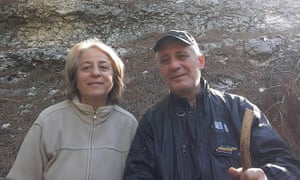'The threats continue’: murder of retired couple chills fellow activists in Turkey
Cedar branches whisper
in the Anatolian breeze. Twigs crunch underfoot. A truck rumbles from a distant
marble quarry. The crack of a hunter’s rifle echoes through the forest. The sounds of
tranquility and violence intermingle at the remote hillside home of Aysin and Ali
Büyüknohutçu, the Turkish beekeepers and environmental defenders whose murder
in Finike earlier this year has sent a chill through the country’s conservation
movement.

If the killings of the
retired couple were not shocking enough, the aftermath – a dubious judicial
investigation and the alleged suicide of the key suspect – have raised
questions in parliament and the media about the priorities of president Recep
Tayyip Erdoğan, who increasingly seems to care more about the economy and
concrete than lives and the environment.
Ali and Aysin were
organic farmers who moved to a remote forest home so that they could be closer
to nature after they retired. A hand-painted sign above
their gate reads “Ali Baba Çiftliği” (Father Ali’s Farm), a joking reference to
the ditty that Turkish children sing to the tune of Old MacDonald. Their
two-storey house and garden – carefully laid out in neat rows of vegetables –
sits in a clearing among cedar and pine trees. Their house itself is
testimony to the couple’s commitment to each other, their country, their family
and the environment. Two cups sit by a kettle on the stove next to an open
sugar bowl. Pride of place on the wall is a portrait of Mustafa Kemal Atatürk,
who founded the Turkish Republic out of the ruins of the Ottoman empire. Below
it are several stacks of books – bedtime stories for their grandchildren, and
publications on global issues: Can a City Be Sustainable?, Worldwatch Institute
on the State of the World 2016 and A Guide to Organic Farming.
Moving there was the
realisation of a long-held ambition. In his youth, Ali had written a poem in
which he declared, “My only wish is a big garden with cheerful children.” “This was their dream
retirement,” said a source close to the family, who asked to remain anonymous
due to fear of reprisals. “They moved there for inner peace. Then they came up
against the marble companies.”
They could not avoid
them. The road up to their home passes from the turquoise coastline of the
Aegean through pomegranate and orange groves to a dusty orange quarry – one of
more than a dozen in Finike. The opencast mines
divert rivers, blast rocks with TNT and stir up dust that chokes the surrounding
vegetation. When the couple
discovered that some had also been opened close to heritage sites in
contravention of licensing regulations, they took action.
Long involved in
leftwing politics, consumer rights groups and residents associations, the
couple linked up with several friends to form a group called Toraçder. “Our initial aim was
to educate people about the environment. Then when we realised the quarries
were damaging the forest, we started to campaign against them,” said Bayram
Taşel, a co-founder. “I knew it was dangerous, but I didn’t think it would lead
to murder.”
They were up against
powerful business interests. Turkey boasts 40% of the world’s marble reserves
and nine out of 10 quarries are found in Anatolia. They are a mainstay of the
regional economy and the country’s $2bn-a-year natural
stone export business. China is currently the biggest customer, but Turkish
marble is also found in Disneyland, the White House, the Vatican, Burj Khalifa,
the Bundestag and luxury hotels across the world. Among those with
family connections to the industry are the Finike mayor and the head of
the Turkey Marble,
Natural Stone and Machinery Association Selahattin Onur. Undaunted, Ali, Aysin
and their fellow campaigners launched a successful challenge that shut down two
marble companies Bartu Mermer and Bahçeci. Bartu Mermer fought back with a
defamation lawsuit against Ali. But he won again in March 2017. The judge not
only acquitted him, but also cancelled the company’s operating license.
Hailing the victory,
Ali predicted it would be the first of many. “Before, citizens were scared to
sue companies – now the decision will encourage all environmentalists,” he
declared… read more
